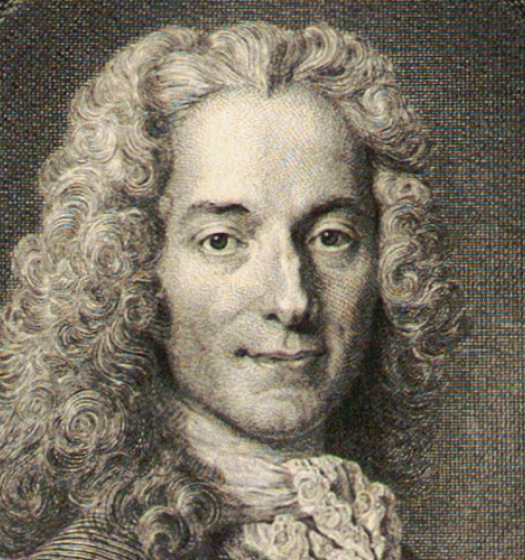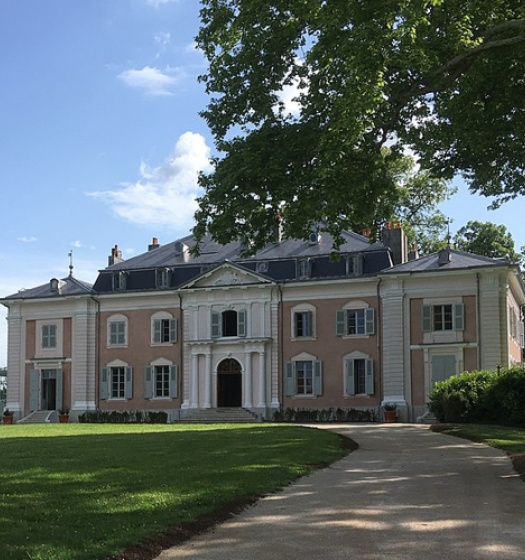An exceptionally rare collection of handwritten papers relating to Voltaire – the celebrated French Enlightenment author, philosopher, satirist and provocateur – has been deposited with the McGill Library’s Rare Books and Special Collections. A future legacy gift, it makes McGill’s holdings one of the most important Voltaire repositories of books and manuscripts in North America.
The Jacqueline Lambert-David Voltaire Collection comprises 1,500 pages of handwritten manuscripts, many of which are written in Voltaire’s own hand. Included are letters, poems, memoirs, notes, legal documents and trial testimonies – all well over 200 years old, a good part not previously published.
“The fact that the entire collection is in manuscript form by or about one of the most quoted and popular authors of the French Enlightenment is exhilarating,” says Ann Marie Holland, Associate Librarian and Curator of Enlightenment Collections, Rare Books and Special Collections, at McGill.
Some of the manuscripts are formal documents bearing Voltaire’s signature and seal. On others you can see him editing his own work – crossing out text, replacing words, and jotting notes in the margins.
“Primary source material on Voltaire is extremely scarce,” says Holland. “The more closely we examine these manuscripts, the more our curiosity is piqued.”
The Collection has been donated by Prof. Peter Southam, a member of Canada’s Southam newspaper dynasty and a retired history professor who taught at the University of Sherbrooke; it is named after his mother. Her family had owned Voltaire’s former estate, and periodically acquired documents relating to the writer.
“Four generations of my family have looked after it,” says Southam. “It is time to make these texts known to the world.”
The Collection will complement the Library’s already outstanding collection of rare books and manuscripts by Voltaire, as well as enhance its significant holdings on the Enlightenment, the French Revolution, and the Napoleonic era.
“Thanks to generations of collectors from the Lambert-David family, including donor Peter Southam, this tremendous, forward-thinking gift will bring with it new discoveries to be uncovered and valuable insights to be found,” says Guylaine Beaudry, Trenholme Dean of Libraries at McGill. “The Jacqueline Lambert-David Voltaire Manuscript Collection will provide countless scholars from McGill University, Montreal, Quebec and around the world with an opportunity to dive even deeper into the rich literary tradition found in Voltaire’s writings.”

Portrait of Voltaire by Jean-Michael Moreau, 1784
18th-century origins
The Jacqueline Lambert–David Voltaire Manuscripts Collection first began to take shape at the grand estate in the French village of Ferney (now Ferney-Voltaire) where Voltaire spent the last 20 years of his life.
Born François-Marie Arouet in Paris in 1694, Voltaire adopted his pen name at age 24, under which he produced a prolific number of books, plays, essays and pamphlets.
“Voltaire is a universally known figure of the French Enlightenment,” says Holland – primarily in literature, history and philosophy, but also in science, politics and religion. He became a renowned advocate for freedom of speech, freedom of religion, the abolition of slavery and the separation of church and state. His best-known work and magnum opus, the novella Candide, was published in 1759.
“The ideas propelled by Voltaire in the 18th century are still at the centre of debate and of collecting interest,” adds Holland.

Voltaire's former estate, now known as the Château de Voltaire.
After Voltaire died in 1778 his estate was sold, and in 1848 it was bought by Claude-Marie David, a local watchmaker, gem merchant, and maternal ancestor of Southam. Included in the purchase of the estate were some Voltaire manuscripts – 19 letters of personal correspondence.
An admirer of Voltaire, David acquired some of the writer’s furniture and invited the public to visit the estate. He also made attempts to add to the manuscript collection, and subsequent generations of his family would do the same.
Items were acquired at estate sales and auctions in the late 1800s, such as personal correspondence letters between Voltaire and his niece. Over 400 pages were added in the early 1900s, and the collection continued to grow until the 1950s through the efforts of Southam’s mother, Jacqueline Lambert-David.
“My mother was passionate about Voltaire,” says Southam. “It is largely thanks to her that the collection survives today.”
As a child, Southam spent his summers visiting his grandparents at the estate. “Voltaire was part of my youth,” recalls Southam. He recounted to Le Devoir how “I spent my days near the front gate where the gardener lived, and every day someone rang asking to visit the place Voltaire had lived. There was a small museum, and on Saturdays there were guided tours.”
When Peter’s mother passed away in 1998, Southam became the sole trustee of the archive – a 150-year-old family treasure that had survived two world wars and an Atlantic crossing.

Prof. Peter Southam
A 21st-century gift
When Southam inherited the collection, “I had the idea that everything that was considered important – all the correspondence – had already been published,” he told the University of Oxford’s Voltaire Foundation for Enlightenment studies. But he soon discovered that this was not, in fact, the case.
He initiated contact with the Voltaire Foundation, led by Prof. Nicholas Cronk, DLitt’23. They confirmed that many of the manuscripts were in Voltaire’s own handwriting, and work began on digitizing the pages. “That’s important to me, because it means these manuscripts are being shared with the world,” said Southam.
In early 2022 a small portion of the Collection – about 60 documents – went on public display in Sherbrooke, Quebec. At the same time, Southam was deliberating how best to ensure its preservation while honouring his mother’s wish that it remain in her adopted land – Canada.
Southam furthermore believed the manuscripts should stay in Quebec, and at a university so they can remain readily available for scholarly research.
“Voltaire is still an important research subject,” says Southam. “I’m confident that McGill is fully equipped to provide optimum conditions of accessibility for researchers. Furthermore, my hope that the Collection can be brought to the attention of scholars and students of 18th-century and Enlightenment studies seems in process of being realized.”
Dean Beaudry couldn’t be happier with his decision. “Voltaire’s ideas continue to resonate with issues related to freedom, tolerance, critical thinking, and the role of individuals and institutions in society,” she says. “We are excited and honoured to steward and share this important collection.”
Visit the Collection
An upcoming exhibit explores the historical gems of the Jacqueline Lambert-David Voltaire Manuscript Collection. From October 18 to December 22, 2023, a selection of manuscripts signed, sealed, and delivered by Voltaire will be exhibited at McGill’s McLennan Library Building, 4th floor. To plan your visit, please consult the opening hours of the The Rare Books Reading Room. For any questions, please email rarebooks.library@mcgill.ca.
On Wednesday, October 18, a lecture on the Voltaire manuscripts will be given by Professor Nicholas Cronk, Director of University of Oxford’s Voltaire Foundation for Enlightenment studies. Registration is required.
On Saturday, October 21, guided tours of the exhibition will be offered during McGill’s Homecoming celebrations. Please register here.

